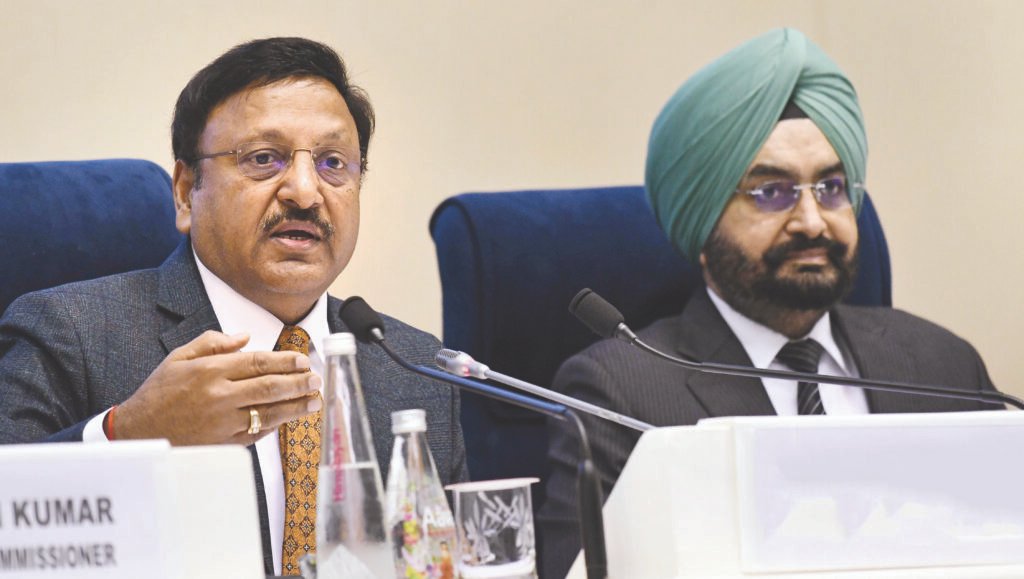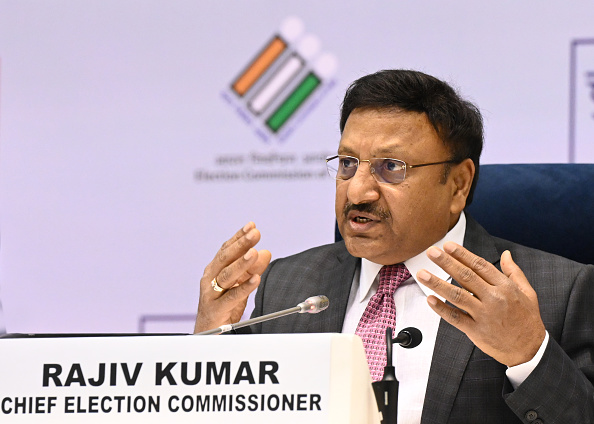
CEC Rajiv Kumar with Election Commissioners Sukhbir Singh Sandhu addressing a press conference to announce the schedule for General Election to Legislative Assemblies of Maharashtra and Jharkhand 2024 in New Delhi on Tuesday, Oct, 15, 2024. Photo by Naveen Sharma/Millennium Post
Maharashtra and Jharkhand will hold assembly polls from Nov 13-20, with 122 million voters participating, influencing national political dynamics.
Roughly 122 million people across Maharashtra and Jharkhand will vote in assembly polls between November 13 and 20, the Election Commission of India (ECI) announced on Tuesday, setting the stage for a fierce contest, the second after general elections this summer, with deep reverberations in national politics.

Chief election commissioner Rajiv Kumar speaks during a press conference for the announcement of the schedule of elections to the Legislative Assemblies of Jharkhand and Maharashtra, in New Delhi, on Tuesday.
The poll watchdog also announced that bypolls to 48 assembly seats and two parliamentary constituencies across 15 states will also be held during this period, making the winter round of elections the largest face-off since the Lok Sabha contest.
The votes will be counted on November 23.
The elections not only hold an opportunity to rule India’s wealthiest state and one of its most mineral-rich provinces, but also offer a chance to alter the national political dynamics. The Bharatiya Janata Party (BJP) will go into the elections just weeks after pulling off a historic and improbable victory in Haryana while the Congress and its regional allies will look to build on their Lok Sabha performances and stave off infighting and complacency that cost them the northern state.
“As the largest democracy on earth, India is setting the gold standard and breaking records… we request everyone to vote in large numbers in these elections,” said chief election commissioner Rajiv Kumar.
Maharashtra’s 96 million voters will exercise their franchise across 288 seats in a single phase on November 20. Kumar said the poll body set up a little over 100,000 polling booths with an array of facilities. In the Lok Sabha elections, Maharashtra’s 48 seats went to the polls across five phases.
The western state which sends the second-highest number of parliamentarians to the Lok Sabha will see a head-on battle between two mega alliances – the ruling Mahayuti, comprising the BJP, the Shiv Sena and the Nationalist Congress Party, and the Maha Vikas Aghadi, comprising the Congress, the Shiv Sena (Uddhav Balasaheb Thackeray) and the Nationalist Congress Party (Sharadchandra Pawar). Also in the fray are a litany of smaller outfits such as the All India Majlis-e-Ittehadul Muslimeen and the Vanchit Bahujan Aghadi.
Jharkhand’s 26 million voters will head to the polls across two phases on November 13 (43 seats in the western part of the state) and November 20 (38 seats in the eastern part of the state). In the Lok Sabha, the state saw four-phase elections. The mineral-rich state, which also boasts of the second-highest proportion of tribespeople in India, will see a largely bipolar battle between the ruling Indian National Developmental Inclusive Alliance (INDIA) led by the Jharkhand Mukti Morcha (JMM), and the National Democratic Alliance (NDA) led by the BJP.
“It is our duty to ensure a level playing field,” said Kumar.
The focus will also be on the results of 48 assembly seats and two parliamentary seats that will go to the polls during this period, especially the Kerala constituency of Wayanad which was vacated by Congress leader Rahul Gandhi, who fought two seats in the Lok Sabha elections and chose to retain Rae Bareli in Uttar Pradesh. Congress general secretary Priyanka Gandhi Vadra is expected to enter the fray from the southern seat.
A clutch of nine assembly bypolls in Uttar Pradesh will be critical to determine the balance of power in India’s most populous state after the BJP posted an underwhelming performance in the general elections this summer.
All constituencies, except Nanded in Maharashtra and Kedarnath in Uttarakhand, will vote on November 13. The two seats will go to the polls on November 20. Votes will be counted alongside Maharashtra and Jharkhand on November 23.

This round of elections comes at an important moment in national politics. The BJP will hope to keep up the momentum after its unexpected victory in Haryana that saw the party post its highest vote and seat share and beat the Congress narrowly, defying exit poll predictions. A good showing in Maharashtra and Jharkhand will embolden the party nationally, boost its plans to usher in big-bang reforms and puncture the Opposition’s narrative that the Lok Sabha polls, which saw the BJP fail to secure a majority on its own, had robbed the NDA of a decisive mandate.
The INDIA bloc will take solace from its comprehensive victory in Jammu and Kashmir, but the Congress will look to reverse its sorry showing in both provinces that went to the polls and plug lacunae such as infighting, overconfidence and factionalism. The Opposition bloc will take heart in its impressive showing in both , but especially Maharashtra, in the Lok Sabha elections.
The polls in Maharashtra, which houses India’s financial capital Mumbai, will also hold high stakes for two regional outfits – the Sena and the NCP – that suffered vertical splits in the last three years and will vie for the same chunk of the electorate. The legacy of the Thackeray family and the Pawar family will, once again, be among the decisive issues in these polls.
In the general elections, the INDIA bloc won 30 of the 48 Lok Sabha seats in Maharashtra. The Congress emerged as the largest party winning 13 seats. The BJP and Shiv Sena (UBT) won nine seats each, Nationalist Congress Party (SP) eight, the Eknath Shinde-led Sena seven, the Ajit Pawar-led NCP one, and an independent one.
But the assembly elections are likely to be more fiercely fought as chief minister Eknath Shinde has announced a slew of sops, including a Diwali bonus for government employees hours before the poll announcement. The elections are likely to be fought around the issues of regional pride, quotas for Marathas and other communities, welfare outreach such as the Ladki Bahin scheme that gives ₹1,500 to women between 21 and 65 every month, the split in the NCP and Sena, governance gaps and local factors.
In 2019, the BJP-Shiv Sena alliance secured a majority, with the former winning 105 and the latter 56. But the alliance collapsed due to differences over the chief ministerial post. The BJP’s Devendra Fadnavis was sworn in as chief minister with the NCP’s Ajit Pawar his deputy on November 23, 2019. The two resigned three days later. On November 28, 2019, Sena, NCP, and Congress formed the government as part of an ideologically disparate MVA alliance, with Uddhav Thackeray as the chief minister.
But Thackeray resigned on June 29, 2022, after Eknath Shinde led 40 lawmakers to rebel against the Sena. On June 30, 2022 he was sworn in as chief minister with support from the BJP and with Fadnavis as his deputy.
In July 2023, the NCP split with Ajit Pawar and42leaders breaking away from the parent party to join the Shinde-led government. Ajit Pawar, who was the deputy CM in the outgoing MVA government, again became deputy to Shinde along with Fadnavis.

“From ‘Ladki Bahin to senior citizens, from farmers to common man, we made everyone a stakeholder of power through schemes. We are facing elections by putting a united front on the basis of development. This will reflect in the elections,” Shinde said.
State Congress president Nana Patole said the MVA allies were well prepared for the polls . “In Maharashtra elections, we will secure a good share of votes and form the government,” he said.
In 2019, the Jharkhand Mukti Morcha (JMM)-led alliance emerged as the winner in Jharkahnd with 47 seats. The BJP bagged 25 seats. In the 2024 general elections, the BJP won eight of the 14 Lok Sabha seats, with the JMM winning three and the Congress two. The BJP’s long-term ally All Jharkhand Students Union won the remaining seat.
“We are confident that the alliance led by our leader Hemant Soren would return to power with a bigger majority,” JMM spokesperson Manoj Pandey said.
Assam CM and BJP’s co-incharge for Jharkhand Himanta Biswa Sarma said the elections will be a contest between appeasement politics and development. “On one side is the INDI alliance’s track record of sin, corruption and appeasement in the last five years, and on the other side is Modi Ki Guarantee, which will take the state on the path of progress in the coming 5 years,” he posted on X.
Discover more from
Subscribe to get the latest posts sent to your email.






